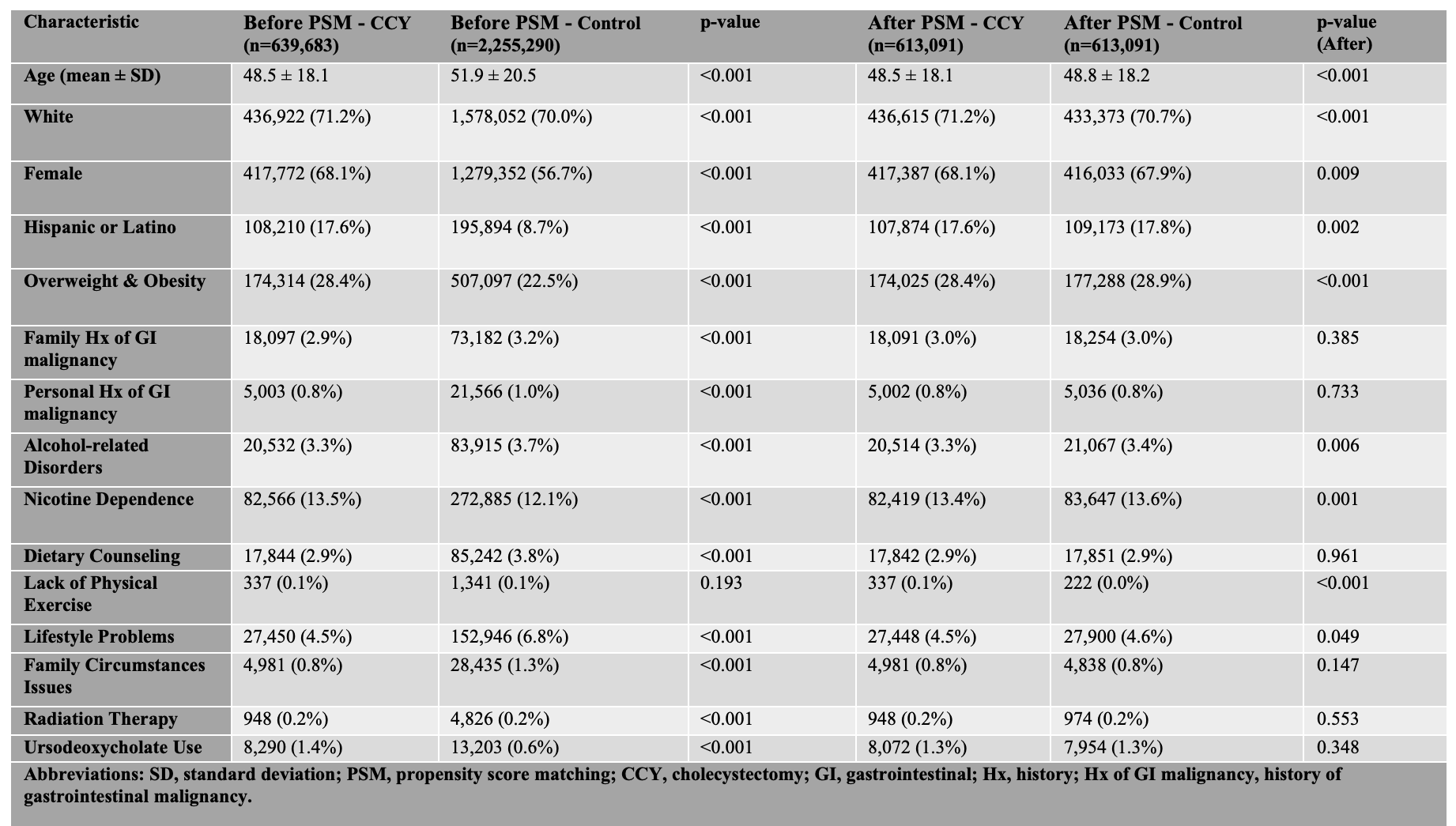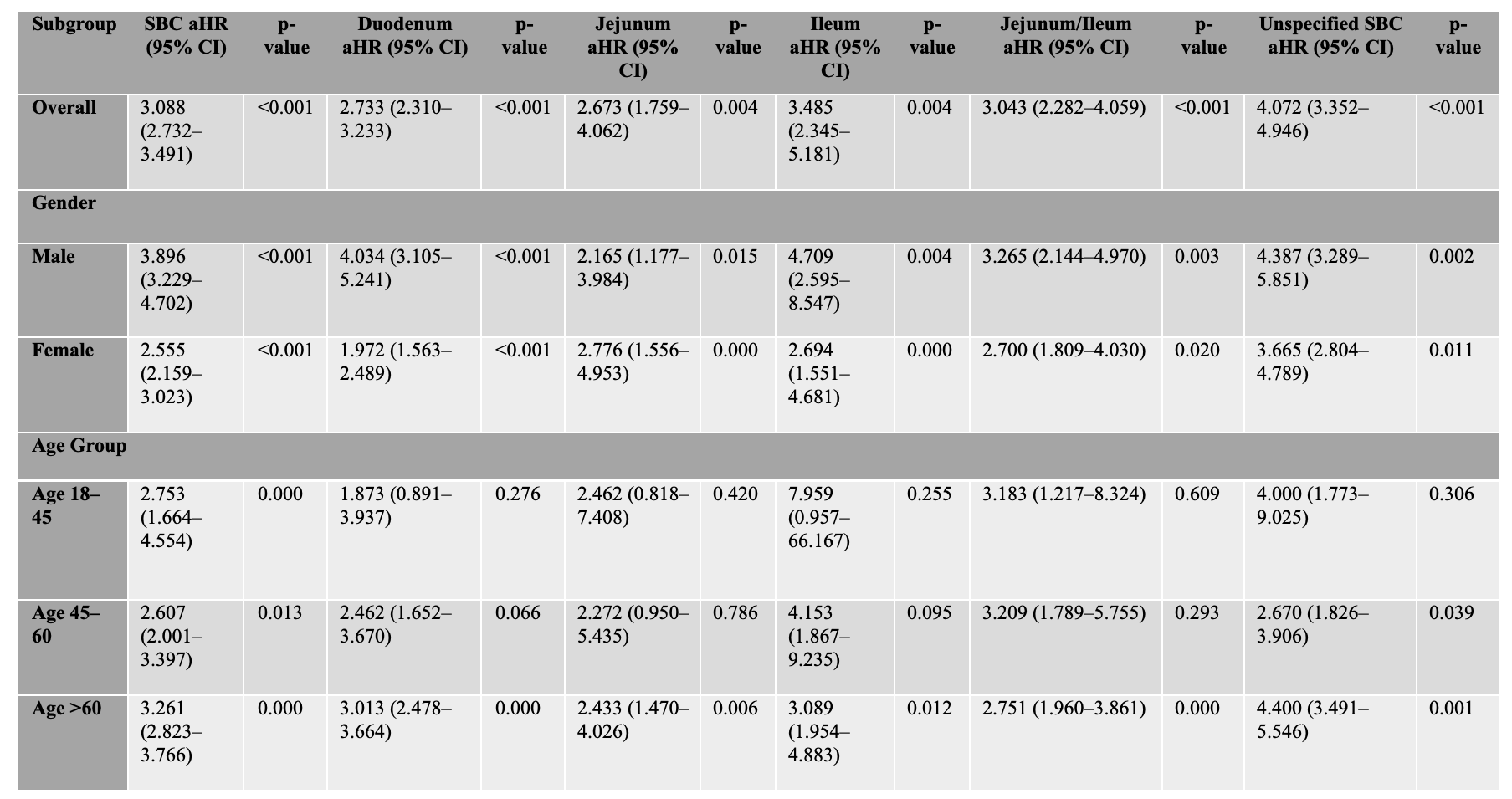Tuesday Poster Session
Category: Small Intestine
P6216 - Increased Risk of Small Bowel Cancer Following Cholecystectomy: A Propensity Score-Matched Analysis
Tuesday, October 28, 2025
10:30 AM - 4:00 PM PDT
Location: Exhibit Hall

Razan Aburumman, MD
Henry Ford Health
Detroit, MI
Presenting Author(s)
Razan Aburumman, MD1, Mohammad Abuassi, MD2, Saqr Alsakarneh, MD, MSc3
1Henry Ford Health, Detroit, MI; 2University of Central Florida, HCA Healthcare GME, Gainesville, FL; 3Mayo Clinic, Rochester, MN
Introduction: While cholecystectomy is a common surgical intervention for gallbladder disease, emerging evidence suggests a potential association with increased risk of gastrointestinal malignancies, including small bowel cancer (SBC). We conducted a large-scale, propensity-matched cohort analysis to assess the risk of SBC and its subtypes following cholecystectomy, stratified by gender and age group.
Methods: Using the TriNetX electronic health records network, patients who underwent cholecystectomy were matched 1:1 with general population controls. Outcomes included SBC and its subtypes (duodenum, jejunum, ileum, combined jejunum/ileum, and unspecified sites). Hazard ratios (HR) and 95% confidence intervals (CI) were calculated via Kaplan–Meier survival analysis, stratified by gender and age group (18–45, 45–60, >60 years).
Results: A total of 613,091 patients who underwent cholecystectomy were included (mean age 48.5 ± 18.1 years, 68.1% female, and 71.2% White). Cholecystectomy was associated with an increased risk of SBC across all subgroups. In gender-stratified analyses, Males consistently exhibited higher hazard ratios (HRs) across all cancer subtypes, with the highest observed in ileum cancer (HR 4.71; 95% CI: 2.60–8.55; p=0.004). Females also showed significantly elevated risks, though generally of lower magnitude. The risk of small bowel cancer increased with age. Patients over 60 had the highest hazard ratios, notably for unspecified small bowel cancer (HR 4.40; 95% CI: 3.49–5.55; p=0.001) and duodenal cancer (HR 3.01; 95% CI: 2.48–3.66; p< 0.001). The 45–60 age group showed elevated risks for duodenal cancer (HR 2.46; 95% CI: 1.65–3.67) and overall small bowel cancer (HR 2.61; 95% CI: 2.00–3.40; p=0.013). Although the 18–45 group had the highest point estimate for ileum cancer (HR 7.96; 95% CI: 0.96–66.17), it was not statistically significant.
Discussion: Cholecystectomy is independently associated with an increased risk of small bowel cancer. The elevated risk persists across genders and is most pronounced in males and older adults. These findings highlight the need for age- and sex-specific risk assessment in clinical practice and support further research into tailored screening and early diagnostic strategies for small bowel malignancies post-cholecystectomies.

Figure: Table 1: Baseline Characteristics of Patients With and Without Prior Cholecystectomy Before and After Propensity Score Matching

Figure: Table 2: Hazard Ratios for Small Bowel Cancer Outcomes After Cholecystectomy Compared to Matched Controls – Subgroup Analysis by Gender and Age
Disclosures:
Razan Aburumman indicated no relevant financial relationships.
Mohammad Abuassi indicated no relevant financial relationships.
Saqr Alsakarneh indicated no relevant financial relationships.
Razan Aburumman, MD1, Mohammad Abuassi, MD2, Saqr Alsakarneh, MD, MSc3. P6216 - Increased Risk of Small Bowel Cancer Following Cholecystectomy: A Propensity Score-Matched Analysis, ACG 2025 Annual Scientific Meeting Abstracts. Phoenix, AZ: American College of Gastroenterology.
1Henry Ford Health, Detroit, MI; 2University of Central Florida, HCA Healthcare GME, Gainesville, FL; 3Mayo Clinic, Rochester, MN
Introduction: While cholecystectomy is a common surgical intervention for gallbladder disease, emerging evidence suggests a potential association with increased risk of gastrointestinal malignancies, including small bowel cancer (SBC). We conducted a large-scale, propensity-matched cohort analysis to assess the risk of SBC and its subtypes following cholecystectomy, stratified by gender and age group.
Methods: Using the TriNetX electronic health records network, patients who underwent cholecystectomy were matched 1:1 with general population controls. Outcomes included SBC and its subtypes (duodenum, jejunum, ileum, combined jejunum/ileum, and unspecified sites). Hazard ratios (HR) and 95% confidence intervals (CI) were calculated via Kaplan–Meier survival analysis, stratified by gender and age group (18–45, 45–60, >60 years).
Results: A total of 613,091 patients who underwent cholecystectomy were included (mean age 48.5 ± 18.1 years, 68.1% female, and 71.2% White). Cholecystectomy was associated with an increased risk of SBC across all subgroups. In gender-stratified analyses, Males consistently exhibited higher hazard ratios (HRs) across all cancer subtypes, with the highest observed in ileum cancer (HR 4.71; 95% CI: 2.60–8.55; p=0.004). Females also showed significantly elevated risks, though generally of lower magnitude. The risk of small bowel cancer increased with age. Patients over 60 had the highest hazard ratios, notably for unspecified small bowel cancer (HR 4.40; 95% CI: 3.49–5.55; p=0.001) and duodenal cancer (HR 3.01; 95% CI: 2.48–3.66; p< 0.001). The 45–60 age group showed elevated risks for duodenal cancer (HR 2.46; 95% CI: 1.65–3.67) and overall small bowel cancer (HR 2.61; 95% CI: 2.00–3.40; p=0.013). Although the 18–45 group had the highest point estimate for ileum cancer (HR 7.96; 95% CI: 0.96–66.17), it was not statistically significant.
Discussion: Cholecystectomy is independently associated with an increased risk of small bowel cancer. The elevated risk persists across genders and is most pronounced in males and older adults. These findings highlight the need for age- and sex-specific risk assessment in clinical practice and support further research into tailored screening and early diagnostic strategies for small bowel malignancies post-cholecystectomies.

Figure: Table 1: Baseline Characteristics of Patients With and Without Prior Cholecystectomy Before and After Propensity Score Matching

Figure: Table 2: Hazard Ratios for Small Bowel Cancer Outcomes After Cholecystectomy Compared to Matched Controls – Subgroup Analysis by Gender and Age
Disclosures:
Razan Aburumman indicated no relevant financial relationships.
Mohammad Abuassi indicated no relevant financial relationships.
Saqr Alsakarneh indicated no relevant financial relationships.
Razan Aburumman, MD1, Mohammad Abuassi, MD2, Saqr Alsakarneh, MD, MSc3. P6216 - Increased Risk of Small Bowel Cancer Following Cholecystectomy: A Propensity Score-Matched Analysis, ACG 2025 Annual Scientific Meeting Abstracts. Phoenix, AZ: American College of Gastroenterology.
